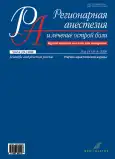Influence of anesthesia methods on the immune system of patients with oncological diseases of the abdominal organs
- Authors: Neimark M.I.1, Tanatarov S.Z.2
-
Affiliations:
- Altai State Medical University of the Ministry of Health of the Russian Federation
- Non-profit Joint Stock Company “Semey Medical University”
- Issue: Vol 14, No 4 (2020)
- Pages: 185-192
- Section: Original articles
- URL: https://bakhtiniada.ru/1993-6508/article/view/62387
- DOI: https://doi.org/10.17816/1993-6508-2020-14-4-185-192
- ID: 62387
Cite item
Abstract
Modern anesthesia, based on the use of halogenated hydrocarbons, nitrogen monoxide, or xenon, cannot fully ensure the interruption of nociceptive impulses at the level of the stem and spinal and subcortical formations, which caused vegetative and metabolic signs related to pain. To prevent the negative effects of pain, additional methods are used, including intraoperative analgesia and regional blockades. This study was conducted to assess the effects of various types of anesthesia, including epidural blockade, on the parameters of the immune system in patients with cancer. A total of 438 patients with malignant neoplasms of the abdominal organs were examined. In these patients, levels of cytokines (such as tumor necrosis-alpha and interleukin-6) and T-lymphocytes of various clusters of differentiation in the blood were measured. Impaired cytokine balance in patients with oncological diseases of the abdominal cavity was accompanied by the formation of suppression of cellular immunity in the postoperative period. Measurements revealed immunosuppression that was largely dependent on the type of anesthesia used. Cellular parameters with the greatest relationship with immunity were preserved during combined anesthesia, including epidural blockade.
Full Text
##article.viewOnOriginalSite##About the authors
M. I. Neimark
Altai State Medical University of the Ministry of Health of the Russian Federation
Email: sayat68@mail.ru
ORCID iD: 0000-0001-9135-6392
Russian Federation, 40, Lenina street, Barnaul, 656038
Sayat Z. Tanatarov
Non-profit Joint Stock Company “Semey Medical University”
Author for correspondence.
Email: sayat68@mail.ru
ORCID iD: 0000-0001-8958-8768
MD, PhD, DSc, Assistant of the Department of Anesthesiology and Reanimatology, NJSC “Semey Medical University”
Kazakhstan, 071400, Semey city, 103 Abay streetReferences
- Brown EN, Pavone KJ, Naranjo M. Multimodal General Anesthesia: Theoryand Practice. Anesth Analg. 2018;127(5): 1246–1258. doi: 10.1213/ANE.0000000000003668.
- Sommer C. Exploring pain pathophysiology in patients. Science. 2016;354(6312): 588–592. doi: 10.1126/science.aaf8935.
- Sumin AS. Anesthesiology and reanimatology. Moskow. MIA, 2018. 968 pp. (in Russ).
- di Mola FF, di Sebastiano P. Pain and pain generation in pancreatic cancer. Langenbecks Arch Surg. 2008;393(6):919–922. doi: 10.1007/s00423-007-0277-z.
- Kularathna PK, Pagel CN, Mackie EJ. Tumour progression and cancer-induced pain: a role for protease-activated receptor-2? Int J Biochem Cell Biol. 2014;57:149–156. doi: 10.1016/j.biocel.2014.10.026.
- Perry JA, Douglas H. Immunomodulatory Effects of Surgery, Pain, and Opioids in Cancer Patients. Vet Clin North Am Small Anim Pract. 2019;49(6):981–991. doi: 10.1016/j.cvsm.2019.07.008.
- Gach K, Wyrębska A, Fichna J, Janecka A. The role of morphine in regulation of cancer cell growth. Naunyn Schmiedebergs Arch Pharmacol. 2011;384(3):221–230. doi: 10.1007/s00210-011-0672-4.
- Juneja R. Opioids and cancer recurrence. Curr Opin Support Palliat Care. 2014;8(2):91–101. doi: 10.1097/SPC.0000000000000056.
- Fukui K, Werner C, Pestel G. Influence of anesthesia procedure on malignant tumor outcome. Anaesthesist. 2012;61(3):193–201. doi: 10.1007/s00101-012-1997-1.
- Soltanizadeh S, Degett TH, Gögenur I. Outcomes of cancer surgery after inhalational and intravenous anesthesia: A systematic review. J Clin Anesth. 2017;42:19–25. doi: 10.1016/j.jclinane.2017.08.001.
- Guay J, Nishimori M, Kopp SL. Epidural Local Anesthetics Versus Opioid-Based Analgesic Regimens for Postoperative Gastrointestinal Paralysis, Vomiting, and Pain After Abdominal Surgery: A Cochrane Review. Anesth Analg. 2016;123(6):1591–1602. doi: 10.1213/ANE.0000000000001628.
- Liu CY, Chen KF, Chen PJ. Treatment of Liver Cancer. Cold Spring Harb Perspect Med. 2015;5(9):a021535. doi: 10.1101/cshperspect.a021535.
- Tan Z. Recent Advances in the Surgical Treatment of Advanced Gastric Cancer: A Review. Med Sci Monit. 2019;25:3537–3541. doi: 10.12659/MSM.916475.
- Choi YY, Noh SH, Cheong JH. Evolution of Gastric Cancer Treatment: From the Golden Age of Surgery to an Era of Precision Medicine. Yonsei Med J. 2015; 56(5):1177–1185. doi: 10.3349/ymj.2015.56.5.1177.
- Sugarbaker PH. Peritoneal Metastases from Gastrointestinal Cancer. Curr Oncol Rep. 2018;20(8):62. doi: 10.1007/s11912-018-0703-0.
- Pesi B, Scaringi S, Di Martino C, et al. Results of Surgical Salvage Treatment for Anal Canal Cancer: A Retrospective Analysis with Overview of the Literature. Dig Surg. 2017;34(5):380–386. doi: 10.1159/000453589.
- Chen Z, Zhang P, Xu Y, et al. Surgical stress and cancer progression: the twisted tango. Mol Cancer. 2019;18(1):132. doi: 10.1186/s12943-019-1058-3.
- Alieva M, van Rheenen J, Broekman MLD. Potential impact of invasive surgical procedures on primary tumor growth and metastasis. Clin Exp Metastasis. 2018;35(4):319–331. doi: 10.1007/s10585-018-9896-8.
- Sekandarzad MW, van Zundert AAJ, Lirk PB, et al. Perioperative Anesthesia Care and Tumor Progression. Anesth Analg. 2017;124(5):1697–1708. doi: 10.1213/ANE.0000000000001652.
- Kim R. Effects of surgery and anesthetic choice on immunosuppression and cancer recurrence. J Transl Med. 2018;16(1):8. doi: 10.1186/s12967-018-1389-7.
- Duff S, Connolly C, Buggy DJ. Adrenergic, Inflammatory, and Immune Function in the Setting of Oncological Surgery: Their Effects on Cancer Progression and the Role of the Anesthetic Technique in their Modulation. Int Anesthesiol Clin. 2016;54(4):48–57. doi: 10.1097/AIA.0000000000000120.
- Cata JP. Outcomes of regional anesthesia in cancer patients. Curr Opin Anaesthesiol. 2018;31(5):593–600. doi: 10.1097/ACO.0000000000000636.
Supplementary files









